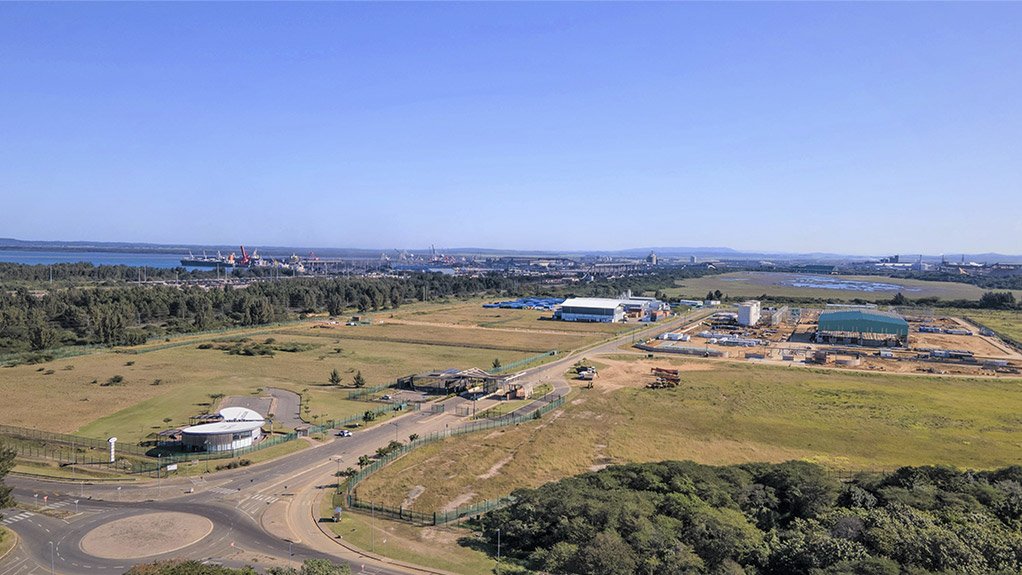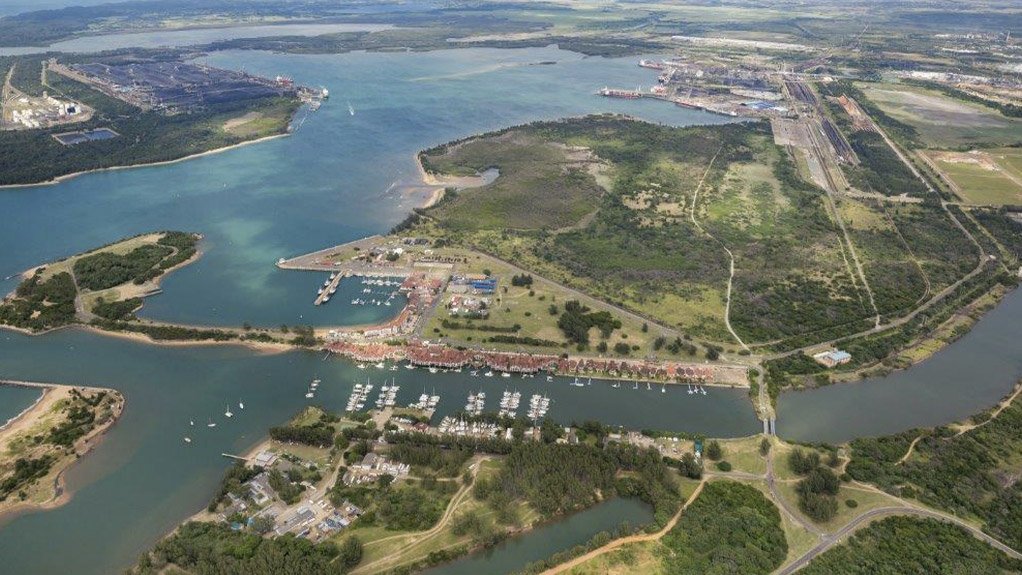Establishing an energy hub in Richards Bay, in line with the Integrated Resource Plan to support South Africa’s energy security, is closely linked to growing KwaZulu-Natal’s (KZN’s) industrialisation and that of the country in general. An intermittent power supply is a limiting factor in South Africa’s economic development, as energy security is a key component of driving industrialisation – the mandate of the Richards Bay Industrial Development Zone (RBIDZ).
Speaking to Engineering News over Zoom from Cape Town while attending this year’s Infrastructure Africa conference, which took place on July 16 and 17 at the Cape Town International Convention Centre, RBIDZ COO Muzi Shange said: “Energy is one of the priority sectors that the organisation is driving development of, over and above metals beneficiation, agroprocessing, ICT and techno hubs.”
The RBIDZ drives industrial development by leveraging on the infrastructure provided by the Port of Richards Bay, which is set to become a key hub for energy trade. This involves the provision of bulk infrastructure for two sites in the port’s South Dunes precinct.
This work will support the liquified natural gas (LNG) terminal being developed at the port by Dutch terminal operator Vopak and its consortium partner Transnet Pipelines. Transnet National Ports Authority awarded the project last year to the consortium, which will design, develop, construct, finance, operate and maintain the LNG terminal for 25 years.
“To ensure that this project is bankable, they will need sufficient offtake and that will come from the RBIDZ, which hosts gas-to-power projects,” elaborates Shange.
The RBIDZ is currently compiling the necessary applications and finalising the related land and rights matters to support the development of the gas pipeline from the port and connect it to Phase 1D. This 65-ha site in the IDZ has been identified by the organisation as the ideal location for a 3 000 MW gas-to-power plant.
Phase 1F will also host several gas projects – namely Richards Bay Gas to Power 2, Richards Bay Gas to Power 3 and the Mabasa Energy and Fuels project – which exceed 5 000 MW. Valued at R150-billion, these projects will assist in driving the energy security vision for the country.
“Our strategy is to build the necessary infrastructure to support power generation but also secure offtake agreements to sell power to our tenants,” adds Shange.
Notably, site clearance and preparation has started for Nyanza Light Metals’ new R14.5-billion investment, which will result in Africa’s first titanium dioxide pigment plant. When considering such investments, it is clear that energy security is important, adds Shange.
“We are a Schedule 3D entity in terms of the Public Finance Management Act and, therefore, are expected to generate our own revenue to sustain ourselves and ensure that we are not dependent on government fiscus for our survival.”
The RBIDZ also intends to generate revenue by supporting its tenants which are looking for alternative natural gas supplies after global chemicals and energy company Sasol, the country’s sole supplier of natural gas for industrial purposes, cuts supply by mid-2026.
“We have the necessary infrastructure to feed those customers, whether it be through the Lilly pipeline, piping gas inland to Secunda, or by supporting diesel-fuelled peaking power stations converted to burn gas. We all know how much money national power utility Eskom has spent on procuring diesel for these peaking stations. If we convert to gas, suddenly, the country will be able to save a lot of money.
“The gas revolution is an important aspect, not just for power generation but also for industrial and domestic use. It should be welcomed by all players because of the beneficial impact it could have on our economy,” Shange advances.
He believes LNG will be a new game changer for South Africa. Thereby, it is vital to develop skills that are aligned to supporting the gas industry.
“In a rural area, like Richards Bay, numerous youth are ‘idling around’, for whom we want to create jobs. Our mandate includes driving foreign and domestic investments that facilitate job creation and employment opportunities, which is one of the major challenges facing our country. Therefore, by working to address the country’s energy security through the development of gas-to-power projects, we are also working to grow greater demand for specific skills and create much needed jobs.”
Edited by: Creamer Media Reporter
EMAIL THIS ARTICLE SAVE THIS ARTICLE
ARTICLE ENQUIRY
To subscribe email subscriptions@creamermedia.co.za or click here
To advertise email advertising@creamermedia.co.za or click here
















